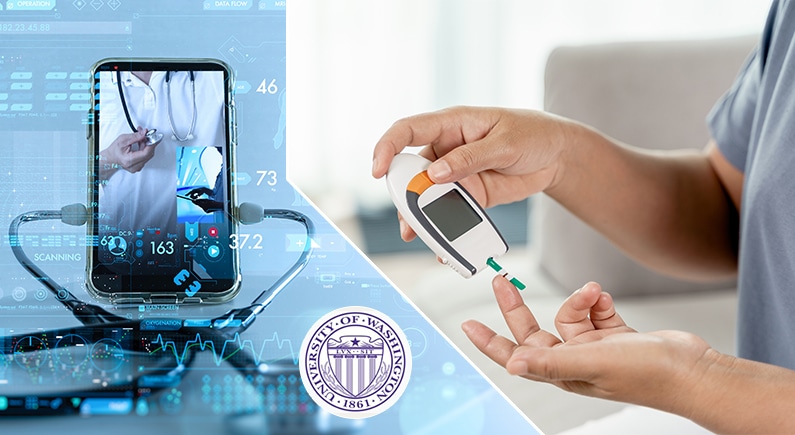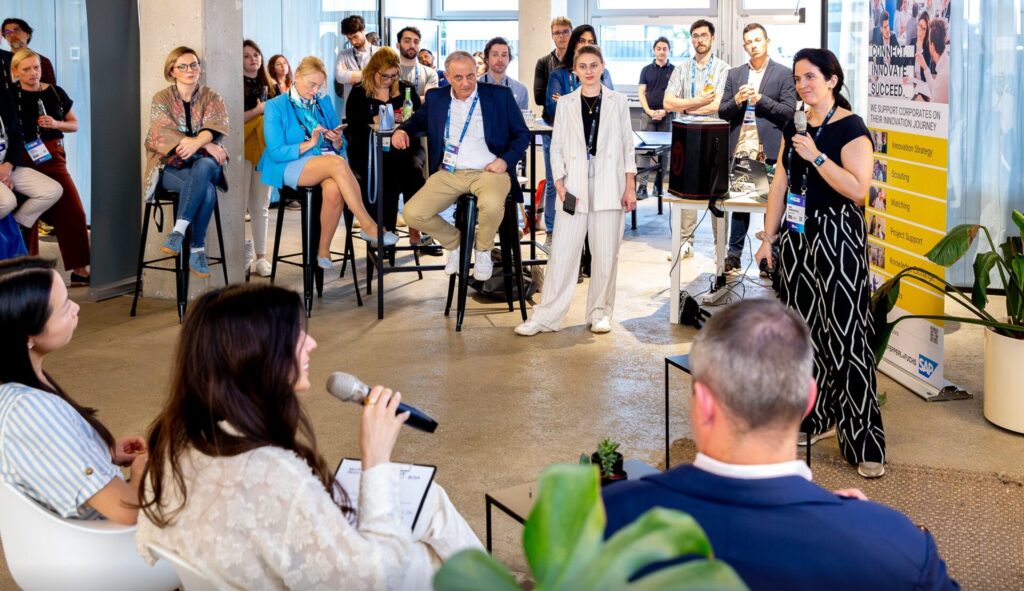
Michael Joe Cini
4th May 2023
University of Washington researchers tap smartphone technology to measure glucose levels
Researchers at the University of Washington have recently developed a new tech-based system to aid clinicians in accurately measuring glucose levels in a non-invasive way. GlucoScreen, a new smartphone system, can test for increased glucose levels indicative of prediabetes. The new test can potentially make prediabetes detection more accessible to potential patients.
How smartphones measure glucose levels
GlucoScreen is one of many cases where researchers integrate technology with clinical diagnostics to enable standardization and efficiency. Multiple current technologies have helped detect jaundice and anaemia. However, in this case, the researchers looked at making diabetes diagnostics more effective with smartphone technology.
The technology works this way: the user places a drop of blood onto a test strip. The test strip contains a substance that the blood reacts with electrochemically. After the electrochemical reaction is completed, the data is transmitted to the smartphone via a series of taps on the touchscreen – similar to Morse code. The test strip derives its power from the smartphone camera’s flash and is, therefore, battery-free.
Anandghan Waghmare, a lead researcher, explained: “In conventional screening, a person applies a drop of blood to a test strip, where the blood reacts chemically with the enzymes on the strip. A glucometer is used to analyze that reaction and deliver a blood glucose reading.” She added, “We took the same test strip and added inexpensive circuitry that communicates data generated by that reaction to any smartphone through simulated tapping on the screen. GlucoScreen then processes the data and displays the result right on the phone, alerting the person if they are at risk so they know to follow up with their physician.”
The test strip does not require batteries or a USB connection, as the strip can draw its power from the phone’s flash. This is enabled by the incorporated photodiodes in the test strip’s design. The GlucoScreen app automatically engages the flash and then walks the user through the process. After applying a drop of blood to the biosensor, the app uses ML (machine learning) to analyze the data and calculate the blood glucose reading.
How GlucoScreen Compares to current technology

In a new paper published in the March 2023 issue of the Proceedings of the Association for Computing Machinery on Interactive, Mobile, Wearable and Ubiquitous Technologies (IMWUT), the University of Washington researchers highlighted the efficacy of GlucoScreen in prediabetes screening. Noting that “early detection of prediabetes can forestall or reverse more serious illness if healthy lifestyle adjustments or medical interventions are made in a timely manner,” the researchers presented the results of a comparison of their technology with other commonly used glucometers.
In an in vitro evaluation with artificial glucose solutions, the researchers, mainly from the Paul G. Allen School for Computer Science and Engineering, tested GlucoScreen with five different smartphones. Upon comparing the results with AccuChek and True Metrix (common glucometers), the researchers detected a mean absolute error (MAE) of 4.52 mg/dl (Accu-Chek test strips) and 3.7 mg/dl (True Metrix test strips), compared to 4.98 mg/dl and 5.44 mg/dl for the AccuChek glucometer and True Metrix glucometer, respectively.
A clinical investigation with 75 patients also recorded significant success. Upon comparing GlucoScreen to AccuChek, GlucoScreen had an MAE of 10.47 mg/dl, while the AccuChek glucometer had a 9.88 mg/dl MAE. This showed that GlucoScreen’s performance is comparable to standard blood glucose testing devices. With a capacitive touchscreen – present on most smartphones in the US today – and minimally-modified, commercially available glucose test strips, it may be possible for patients and primary healthcare workers to carry out diabetes testing anywhere, anytime.
The current prototype makes use of a polymer substrate. However, the researchers are looking into the long-term possibilities for the technology, intending to make a paper substrate that allows GlucoScreen to be eco-friendlier and more sustainable. With this modification, the electronic components for GlucoScreen can be directly affixed to the substrate, making it possible to recycle the test strip.
In addition, at a projected cost of large-scale manufacturing at $2.8 per GlucoScreen strip, the researchers project significant decreases in cost for the new test strip. This indicates a potential to reduce costs by over 90% for initial screening tests, as there is no need for external glucometer devices. The ability to carry out glucose testing at low cost can help health systems promote large-scale screening, assisting researchers to better detect and prevent the onset of diabetes in high-risk individuals
Solving the puzzle: Smartphone Diabetes Diagnostics
GlucoScreen was developed by a team of six researchers at the University of Washington, which includes Anandghan Waghmare, Paul G. Allen School for Computer Science & Engineering, University of Washington; Farshid Salemi Parizi, Department of Electrical & Computer Engineering, University of Washington; and Jason Hoffman, Paul G. Allen School for Computer Science & Engineering, University of Washington. The other researchers on the team are Yuntao Wang, a research professor at Tsinghua University, Matthew Thompson of the Department of Family Medicine, University of Washington, and Shwetak Petal of the Paul G. Allen School for Computer Science & Engineering, University of Washington.
Lead researcher Anandghan Waghmare is currently a PhD student in the Paul G. Allen School for Computer Science & Engineering’s Ubiquitous Computing (UbiComp) research lab. Led by the award-winning Prof. Shwetak Patel of the Paul G. Allen School, the UbiComp lab develops innovative systems for real-world applications in health, sustainability, and novel interactions. The challenging research problems the team at UbiComp have worked on tackling include novel user interface technology, health sensing, activity recognition, low-power sensing, and energy sensing by applying expertise in sensing, signal processing, embedded systems, circuits, and human-computer interaction. UbiComp Lab’s work on GlucoScreen was partly funded by the Bill and Melinda Gates Foundation.
Prediabetes: A significant challenge in the US
Prediabetes is a condition marked by elevated blood sugar, which can readily predispose an individual to diabetes. According to the US Centers for Disease Control (CDC), one in every three adults in the US has this condition. And while it is readily preventable or reversible by simple lifestyle changes, about 80% of Americans with the condition don’t know they have it, preventing them from seeking remedies.
Today, persons who want to test their glucose levels typically have to visit a healthcare facility for laboratory testing or purchase a portable glucometer to test glucose levels at home. GlucoScreen can make glucose testing more accessible to large populations. By leveraging the inbuilt capabilities of any smartphone without the need for a separate glucose level reader, GlucoScreen also has the potential to make glucose testing more affordable.
GlucoScreen is still a research prototype, and additional studies must be conducted before the system can be available. However, the current iteration shows how much medicine can tap into smartphone technology for health screening. “Now that we’ve shown we can build electrochemical assays that can work with a smartphone instead of a dedicated reader, you can imagine extending this approach to expand screening for other conditions,” commented Shwetak Patel, Professor in Computer Science & Engineering at UW and senior author of the research paper.
Catch Med-Tech World in London!
Come and meet the team at the Med-Tech World Roadshow! We are thrilled to invite you to London for an extraordinary night of networking, knowledge-sharing, and innovative ideas in digital health and med-tech. Make sure you don’t miss this chance to connect and exchange ideas about how we can influence the future of healthcare.






